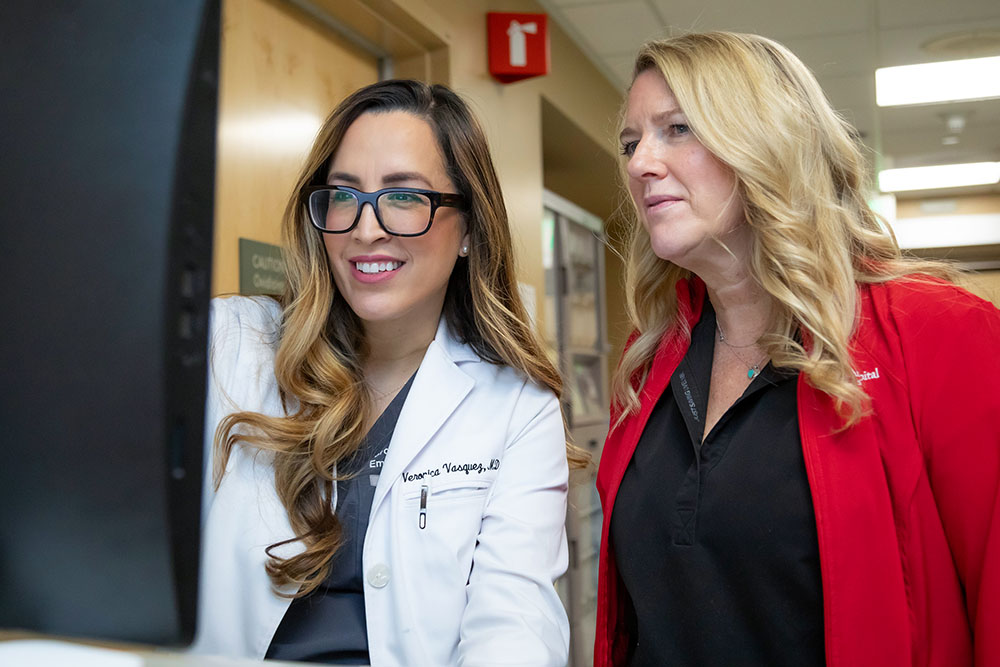
The medical director for USC Arcadia Hospital’s emergency department shares key things to know about emergency care and how to prepare for a potential visit to the ER.
No one ever looks forward to a trip to the emergency room. It means that you, a friend or loved one is having a particularly bad day.
The ER, however, is always there — 24/7, 365 days a year.
Sometimes, your need for it is clear. Other times, you may not be sure that your symptoms are worth a visit.
Veronica Vasquez-Montez, MD, MBA, medical director for USC Arcadia Hospital’s emergency department, shares insights to help you when you’re unsure of what to do.
In addition to life-threatening emergencies, what are some symptoms or health issues that may require a trip to the emergency room?
- Broken bones or dislocations
- Large lacerations or cuts with excessive bleeding
- Persistent abdominal pain
- Newborn babies less than 30 days old with a fever
- Abdominal cramping or vaginal bleeding during pregnancy
What are some symptoms or conditions that may be better for urgent care, walk-in clinics or a primary care doctor?
- Sprains
- Minor lacerations
- Earaches
- Urinary tract infections
- Mild wheezing
- Cold and flu symptoms
- Minor allergic reactions
What are some symptoms that people should be on the lookout for as signs of potentially serious emergencies?
- Chest pain or shortness of breath, which could be signs of a heart attack
- Numbness or weakness in one side of your body, which could be signs of a stroke
For both these types of emergencies, the sooner you receive care, the better. Quick emergency intervention can save lives and improve recovery.
What advice do you have for patients as they self-evaluate their symptoms?
Even with serious emergencies, not everyone experiences the same symptoms.
During a heart attack, a woman’s symptoms may not present the same as a man’s. We often associate crushing chest pain with heart attacks, but women may only experience something as simple as left shoulder pain, shortness of breath or excessive fatigue.
Age is also a factor. Younger and older people may experience different symptoms.
I always tell patients, “You know your body best.” It’s easy for a doctor to know your condition once they have test results, but when something doesn’t feel right, it’s important that you share that.
What do you do if you’re not sure what kind of care your symptoms require?
You can start by calling your primary care doctor’s office or insurance company. They will often have a nurse advice line that can help talk you through your symptoms and guide you on when and where it is best to seek help based on your symptoms.

What advice do you have for someone who may be caring for a friend or loved one who is experiencing concerning symptoms?
Don’t wait. Sometimes people are hopeful things will go away, or they might be afraid to confirm something is wrong. But if you are having concerning symptoms, waiting may result in limiting time-sensitive treatment options or interventions, as well as worsening of your condition.
For people who may hesitate to visit the ER because of fear or negative association with it, what advice do you have?
We recognize that when patients come here, it’s often their worst day. It’s probably not something they expected when they woke up.
What’s special about emergency departments, especially my team, is that we work hard to address the patient’s entire experience — not simply their medical needs, but also their emotional ones.
We develop a quick rapport, make people feel safe and encourage having family members at the bedside when needed.
What else should people keep in mind about the role of an emergency department and what it can provide?
While patients should recognize that going to the ER for minor illnesses or injuries means a longer wait for everyone — including those with life-threatening illnesses — we are still here to serve all comers, regardless of what you are experiencing. We will do our best to help you feel better in a timely fashion.
Interested in supporting the work of Keck Medicine? Visit this page.
Topics


